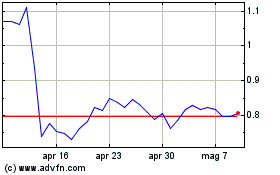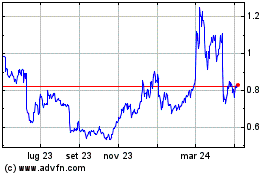How To Create And Mint Your Own NFTs On The Ethereum Network
04 Febbraio 2024 - 10:00AM
NEWSBTC
The allure of creating your own NFTs and BRC-20 tokens is
undeniable. For artists, owning and monetizing their digital
creations through NFTs offers a new level of control and potential
financial reward. Beyond the realm of art, NFTs can foster
passionate communities, grant exclusive access to events, and even
act as fundraising tools. However, stepping into the world of
token creation isn’t without its challenges. It demands both a
technical understanding of blockchain technology and smart
contracts, along with a careful consideration of financial risks
and potential regulatory implications. Before diving in, it’s
crucial to assess your goals, resources, and risk tolerance. While
the possibilities are vast and exciting, responsible and informed
action is key to navigating this rapidly evolving landscape. NFTs,
or Non-Fungible Tokens, are digital assets that represent ownership
or proof of authenticity for specific items or content. Unlike
fungible cryptocurrencies like Bitcoin or Ethereum, NFTs cannot be
exchanged on a one-to-one basis due to their unique nature. NFTs
are typically created and traded on blockchain platforms such as
Ethereum, Binance Smart Chain, and decentralized marketplaces like
OpenSea. These platforms utilize smart contracts to establish
ownership and enable transparent and immutable transactions for
NFTs. Related Reading: What Are The Top 8 DeFi And Web3 Wallets To
Use In Crypto? NFTs can represent a wide range of digital items,
including artwork, music, videos, virtual real estate, and
collectibles. Each NFT has metadata describing the item it
represents and a unique identifier that sets it apart from other
NFTs Creating NFTs On The Ethereum Network The primary stage in the
creation of NFTs involves identifying the content you wish to
associate with your NFT. Consider the specific representation you
desire for your NFT, whether it be digital artwork, collectibles,
virtual real estate, or any other distinct digital item. In this
article, we will use illustrations from OpenSea to guide you on the
steps you need to create your own NFTs. OpenSea stands as a leading
decentralized marketplace built on the Ethereum blockchain,
dedicated to NFTs. It creates a space where users can engage in
buying, selling, and discovering an extensive array of digital
assets, encompassing artwork, virtual real estate, collectibles,
and more. OpenSea delivers a user-friendly interface, showcasing a
vast selection of NFT listings curated from diverse creators and
projects. Through OpenSea, users gain the ability to explore the
NFT community, partake in auctions, and securely manage their
digital assets. With a commitment to fostering the expansion and
accessibility of the NFT market, OpenSea ensures a seamless
experience for enthusiasts and collectors alike. This step-by-step
guide covers how to create an NFT collection and mint directly to
your wallet. First, visit the original OpenSea website, and
click on the “Login” button at the top to connect your preffered
wallet. To figure out the best wallet to use on the Ethereum
network, check here. Next, click on your “Profile Icon” at
the top right of your OpenSea interface in order to deploy a smart
contract and select “Studio” through the pop-up options. Related
Reading: Why Are NFTs Bad? The Problem And Legal Issues To initiate
the creation of a fresh NFT, simply click the “Create” button
located at the top right corner. When you explore the options, you
will find the choice to either Drop a collection or Create/Mint an
NFT. Selecting “Create an NFT”. This will enable you to mint an NFT
directly into your wallet. Once you proceed, a fresh “Create an
NFT” screen will be presented. If you are using OpenSea Studio
tools for the first time to create an NFT, select “Create a new
collection.” You will be able to add one NFT to this collection
initially, with the option to include more NFTs at a later stage.
After selecting “Create a new collection,” you will be guided
through the steps on your screen to deploy a smart contract. This
process will enable you to create NFTs for your newly created
collection. To customize your contract, you need to add a logo
image, choose a contract name, and designate a token symbol.
Additionally, you will need to choose an EVM blockchain. It’s
important to note that deploying a smart contract incurs gas fees,
and the estimated fees for each blockchain will be displayed. If
the fees are higher than anticipated, you can revisit the process
at a later time, as they are subject to change based on network
activity. When you are prepared, proceed by clicking on
“Continue”. This action will prompt a transaction signature request
in your wallet, which will necessitate gas. Once the process is
finalized, you will receive a confirmation message. Proceed to the
next step by selecting “Create an NFT” as shown below.
: Having successfully
created a smart contract, you are now prepared to generate an NFT.
It is important to note that once your item is minted, further
editing becomes impossible as it permanently resides on the
blockchain. In this case, you will be creating an ERC-1155 NFT,
which allows for the creation of multiple copies of the same item.
Related Reading: How To Buy And Trade BRC-20 Tokens On The Bitcoin
Network To begin this phase, upload the media for your NFT, which
represents the artwork associated with it. Next, choose the
collection in which you wish to mint your NFT. Subsequently,
provide a name for your item and set the desired item supply. The
item supply determines the number of copies you wish to mint for
the NFT. If you choose 1, then the item will be a one-of-one.
Next, click on the “Create” button at the bottom right, as shown in
the above image. A loading message will appear as the item is
being minted. To proceed with the minting process, you will need to
approve the transaction using your wallet.
Congratulations! You have successfully minted your very first NFT!
Related Reading: How to Buy, Sell, and Trade ERC-20 Tokens on the
Ethereum Network Conclusion Although NFTs and BRC-20 tokens have
distinct functions and operate on separate blockchains, they both
contribute to the growing realm of blockchain-based digital assets.
NFTs have captured widespread interest for their exceptional nature
and capacity to represent ownership of digital assets.
Grafico Azioni EOS (COIN:EOSUSD)
Storico
Da Dic 2024 a Gen 2025

Grafico Azioni EOS (COIN:EOSUSD)
Storico
Da Gen 2024 a Gen 2025
